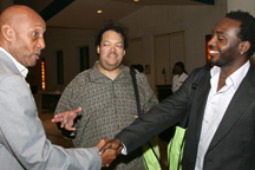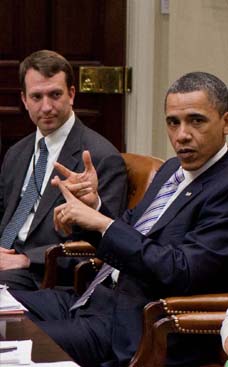
At its center is the relationship between a Tutsi Catholic priest and a local imam, who gives the priest and his flock refuge inside his mosque. The Tutsi priest has been betrayed by a fellow Catholic priest, a Hutu. "I don't confuse the word of God with the actions of men," the imam tells the priest. "Often they are very different." Cheikh Tembo, mufti for all Rwandan Muslims, issued a ruling forbidding Rwanda's Muslims from participating in the massacre. He beseeched them to help their neighbors. "Muslims are a mirror of all good things, as God says," Tembo wrote in a 1994 ruling after a meeting of all the country's imams. "So my brothers and sisters, I ask you all to be mirrors and good examples as God wants us to be." At least two mosques in Rwanda, the Nyamirambo main mosque and one in Cyangugu, were attacked for sheltering Tutsis and moderate Hutus. Brown filmed key scenes at the Islamic Cutlural Center's Khadafi Mosque in Rwanda's capital of Kigali, a mosque used as a refuge during the genocide almost 17 years ago. Mainstream media limited its coverage of Muslim bravery during the genocide to news of how conversions to Islam spiked after the genocide. Rwandan Christians, mostly Catholic, but also Protestants, were alarmed at how their clergy either ignored, or even participated in, the massacre. Rwanda was 5 percent Muslim before 1994. Today, that percentage is estimated at 15 percent. Brown learned of how Muslims united to help Christians when he met Rwandan Ishmael Ntihabose through a Peace Corps colleague. Ntihabose applied for a European Commission grant on genocide and reconciliation, and teamed with Brown as an executive producer for a film about Rwnada's genocide after the grant came through. "I told Alrick that if the film touched on the value of humanity, I will be happy," Ntihabose said. "Film has no borders."
Filmmaker Alrick Brown's 'Kinyarwanda' finds the humanity behind genocide
Sundance: ‘Kinyarwanda' finds the humanity behind genocide
By ben Fulton
The Salt Lake Tribune
First published Jan 27 2011 05:51PM
Updated Jan 28, 2011 06:33PM
Like the stories that fill the periphery of his film "Kinyarwanda," Alrick Brown came to film almost by chance.
Born in Kingston, Jamaica, Brown graduated from Rutgers University with a bachelor's degree in English and a master's in education. He served in the Peace Corps on Africa's Ivory Coast.
But it wasn't until he visited the slave castle of Elmina in Ghana - a key trading post of the African slave trade - that Brown decided to make films exploring the lesser-known events of history. In the process, he found himself mining the spiritual recesses of the human heart.
"Truth in times like these is a revolutionary action," Brown said by phone from Park City. "That's always been my work."
"Kinyarwanda," his 100-minute entry in Sundance's World Cinema dramatic competition, is revolutionary on two counts. It's the first dramatic feature film produced and conceptualized by Rwandans. It's also the first film to tell the true story of how that country's Muslims mobilized against the 1994 genocide that consumed an estimated 1 million people. Brown's feature confronts themes of redemption and forgiveness in the face of unrelenting vengeance.
At its center is the relationship between a Tutsi Catholic priest and a local imam, who gives the priest and his flock refuge inside his mosque. The Tutsi priest has been betrayed by a fellow Catholic priest, a Hutu.
"I don't confuse the word of God with the actions of men," the imam tells the priest. "Often they are very different."
Cheikh Tembo, mufti for all Rwandan Muslims, issued a ruling forbidding Rwanda's Muslims from participating in the massacre. He beseeched them to help their neighbors.
"Muslims are a mirror of all good things, as God says," Tembo wrote in a 1994 ruling after a meeting of all the country's imams. "So my brothers and sisters, I ask you all to be mirrors and good examples as God wants us to be."
At least two mosques in Rwanda, the Nyamirambo main mosque and one in Cyangugu, were attacked for sheltering Tutsis and moderate Hutus. Brown filmed key scenes at the Islamic Cutlural Center's Khadafi Mosque in Rwanda's capital of Kigali, a mosque used as a refuge during the genocide almost 17 years ago.
Mainstream media limited its coverage of Muslim bravery during the genocide to news of how conversions to Islam spiked after the genocide. Rwandan Christians, mostly Catholic, but also Protestants, were alarmed at how their clergy either ignored, or even participated in, the massacre. Rwanda was 5 percent Muslim before 1994. Today, that percentage is estimated at 15 percent.
Brown learned of how Muslims united to help Christians when he met Rwandan Ishmael Ntihabose through a Peace Corps colleague. Ntihabose applied for a European Commission grant on genocide and reconciliation, and teamed with Brown as an executive producer for a film about Rwnada's genocide after the grant came through.
"I told Alrick that if the film touched on the value of humanity, I will be happy," Ntihabose said. "Film has no borders."
The Rwandan native traveled to Park City to see the film's U.S. premiere on Monday, Jan. 24. He was 14 years old at the time of the genocide, but remembers how the Muslim community organized to shelter Tutsis and moderate Hutus.
"Of course I thought it was an amazing story," Brown said. "The reason this story has never been told is that people were so drawn to the sensationalism of the genocide at the time. It was so evil people forgot humanity can still survive through good deeds."
Part of the film portrays the rich everyday life of Rwanda before machete-wielding Hutus of the Interahamwe militia moved against their Tutsi countrymen. Teenagers dance and flirt. Children play and run errands. A Hutu husband and Tutsi wife bicker. The film's narrative moves back in time, but also forward to the 2004 program of reconciliation the Rwandan government launched to heal the nation's wounds.
"Kinyarwanda" condemns the atrocity of genocide through scenes that depict the beauty of Rwandan life lost, rather than graphic violence. The audience comes face-to-face with the anguish and torment of hatred and violence in searing scenes when men confess their war crimes straight to the camera.
"Forgiveness is asking for a miracle," a woman at a government reconciliation camp tells the men. "It is the ability to see through someone's mistakes to the truth that lies within all of our hearts."
The film's inherent lesson is the short distance between hateful words and hateful actions. "We are not as far away from Rwanda as we like to think," Brown said. "Once you study history and talk to the very people who lived through it, you realize it's frighteningly simple."














